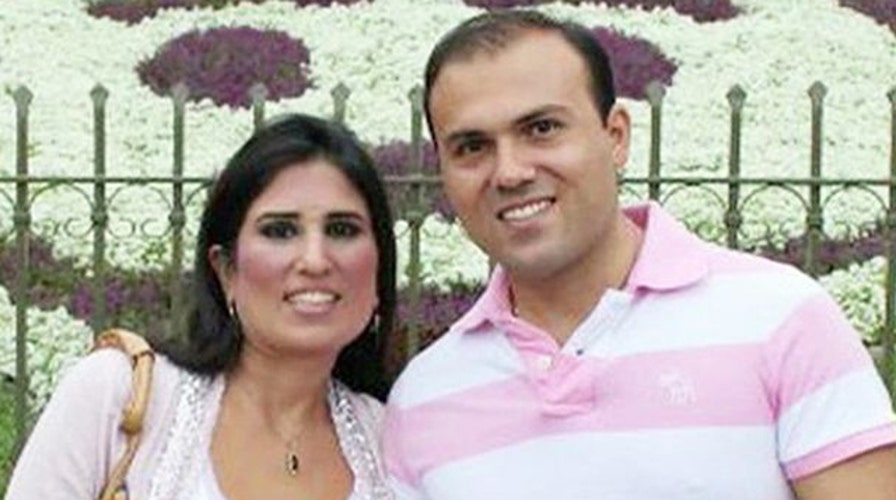Wife of US pastor held in Iran to testify before Congress
Naghmeh Abedini to press lawmakers to fight for husband's freedom
On Monday, March 11, at a crucial moment, the State Department turned its back on an American pastor imprisoned in Iran.
In September of last year, Saeed Abedini – a U.S. citizen from Idaho – was arrested by Iran’s jihadist Revolutionary Guard when he was in Tehran helping build an orphanage. He was tortured, tried, convicted, and sentenced to eight years in Iran’s most brutal prison simply because of his Christian faith.
In other words, he’s an American hostage.
At the American Center for Law & Justice, we represent Pastor Saeed’s wife and two young children, and we’ve launched a national and international effort to pressure the Iranian regime to release Pastor Saeed. More than 100 members of Congress have issued strongly bipartisan calls for his release, spokespersons from the White House and State Department have called for his release.
[pullquote]
Yet as welcome as those comments were, none of them were directly addressed to the Iranian regime. Because we long ago broke off diplomatic relations with Iran, American opportunities to speak to Iran are rare.
But in Geneva this week, just such an opportunity arose. On Monday, the United Nations Human Rights Council held meetings that directly addressed the human rights crisis in Iran. Before the meeting, the ACLJ launched a petition calling for international intervention on Pastor Saeed’s behalf, and more than 425,000 people from the U.S. and across the world signed in the weeks leading up the meetings.
The international community responded.
The Report of the U.N. Special Rapporteur on human rights in Iran mentioned Pastor Saeed by name.
The Council permitted our ACLJ affiliate, the European Centre for Law and Justice, to address the Council on Pastor Saeed’s behalf twice.
Australia spoke out for Pastor Saeed.
Critically, the European Union – representing collectively the largest economic entity in the world -- called for Pastor Saeed’s release by name:
"We deplore the systematic harassment of members of religious minorities. We call on the Iranian authorities to refrain from such practices and to ensure respect for freedom of religion and belief. We call for the immediate release of prisoners of conscience, including Pastors Behnam Irani, Farshid Fathi and Saeed Abedini and the leaders of the Baha ́i community."
Roughly five minutes after the EU presentation – after a strong international statement on behalf of a U.S. citizen – it was the U.S. representative’s turn at the microphone. Here is what the United States said about its imprisoned and tortured citizen, Pastor Saeed. I quote in full:
. . .
Nothing.
The U.S. said nothing about Pastor Saeed. Not one word. Yes, we condemned human rights abuses in Iran, and yes we even mentioned an Iranian blogger by name. But an American citizen? Imprisoned by the Revolutionary Guard? Nothing. No comment.
Yes, the Obama State Department has called for his release from the podium here at home – a brief statement only in response to inquiries from reporters. A White House spokesman made a similar statement in an answer to media inquiries. However, by refusing to petition for Pastor Saeed’s release before the UN Human Rights Council, our State Department acted like a lawyer who advocates for his client on the courthouse steps but won’t say anything at all to the judge.
On Friday, I will have the opportunity to testify before the Tom Lantos Human Rights Commission of the United States House of Representatives. I’ll be joined by our ACLJ Executive Director, Jordan Sekulow, and by Pastor Saeed’s heroic wife, Naghmeh. At that hearing, I will call – as many members of Congress have – for the State Department and White House to do exactly what it should on behalf of Americans held hostage in hostile lands: The president and Secretary of State need to engage this case personally – and to use their influence and the full weight of the U.S. government to secure their release. We owe them no less.
To be clear, this is not and should not be a partisan issue. Democrats and Republicans on Capitol Hill have called for Pastor Saeed’s release, and if the Obama administration reverses course and begins to not only advocate for Pastor Saeed from the highest levels, but also matches words with strong diplomatic actions, then I will be the first to applaud its efforts.
But until then, there is only this sad reality: In March, when it mattered, the Obama administration left an American behind.

